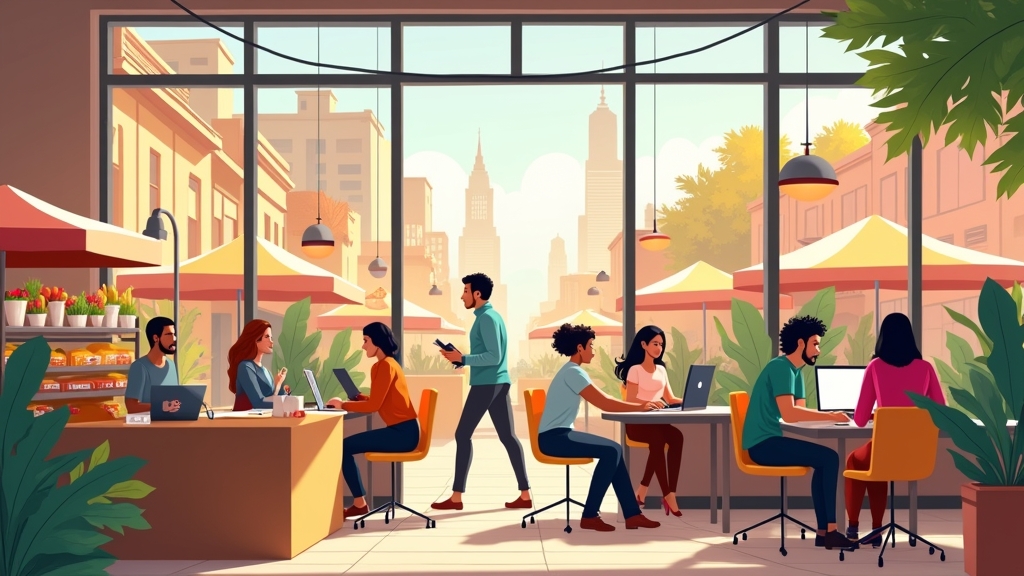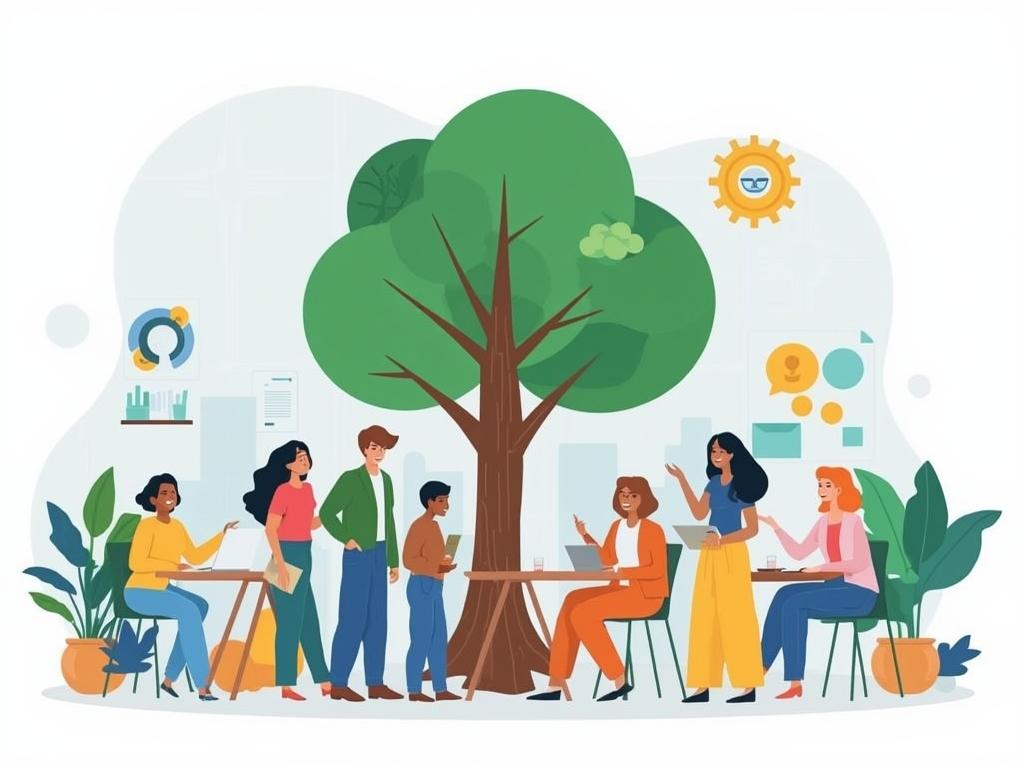The Rise of "Local Hybrid Jobs": How the Valorization of Regional Trade is Creating New Post-Globalization Career Opportunities
Have you ever stopped to think about how the pandemic has accelerated changes that were already underway in the world of work? While the traditional model of central offices is losing momentum, a new trend is emerging: the "local hybrid works"This is a movement that combines remote flexibility with a strong link to the regional economy. This movement not only redefines careers, but also strengthens local production chains, creating more sustainable jobs that are less dependent on global fluctuations.
In this article, we'll explore how the appreciation of regional trade is shaping new professions, which skills are most in demand and how you can prepare for this transformation. We'll dive into real examples, concrete data and strategies for those who want to ride this wave.
What Are Local Hybrid Jobs and Why Did They Come About?
Local hybrid jobs are a response to two simultaneous phenomena: the crisis of global production models and search for greater economic resilience. Companies and professionals are realizing that relying exclusively on international chains can be risky, as we have seen during the pandemic and recent geopolitical conflicts.
But how does this translate into practice? Imagine a designer working remotely for a sustainable fashion brand in your city, helping to create garments using local raw materials. Or a digital marketing consultant who helps small rural producers sell their products online. These professions mix global skills (such as technology and communication) with a hyperlocal gaze (understanding the culture and needs of the region).
Why is this happening now? In addition to the impacts of globalization, there is a growing awareness of sustainability and responsible consumption. Studies show that local trade has grown 12% in the last two years in BrazilThis is driven by consumers who prefer brands with a regional identity.
Advertising
Have you considered how your skills could be applied to local projects? Often, what's missing is precisely the connection between those with digital know-how and those who produce in the area.
How Valuing Regional Trade Is Creating Jobs
When we talk about local commerce, we're not just referring to small neighborhood stores. We're talking about expanding ecosystem which includes family farming, handicrafts, experiential tourism and even creative industries. Each of these sectors is generating demands for professionals capable of uniting technology and community roots.
A clear example is regional agribusiness. Before, an artisan cheese producer had to rely on intermediaries to sell his products. Today, with the help of an e-commerce specialist, they can reach consumers all over the country while maintaining their local identity. Platforms such as Home Market prove that it is possible to scale regional businesses without losing authenticity.
Another field on the rise is community-based tourism. Local guides who combine digital storytelling with immersive itineraries are winning over travelers looking for unique experiences. Cities like Paraty and Bonito already have professionals specialized in translating their culture into the digital world, attracting a public willing to pay more for authenticity.
And it's not just traditional areas that benefit. Professionals from IT and software development are being hired to create customized solutions for cooperatives and small industries. An app that connects market traders directly to consumers, for example, requires technical knowledge and an understanding of local dynamics.
What does this mean for you? Whatever your field, there is room for you to act as a bridge between the global and the local. You just need to identify where your skills can solve real problems in your region.
What Skills are Most Valued in this New Market?
If local hybrid jobs require a mix of skills, what are they? We can divide them into three categories: technical, social and adaptive.
In the technical field, mastery of digital tools is essential. From video editing to promote artisanal products to data analysis to understand the local consumer profile. Platforms such as Coursera offer affordable courses in digital marketing, logistics and other useful areas for those who want to work in this field.
Social skills include ability to collaborate It is cultural intelligence. Working with communities requires sensitivity to negotiate with different generations - from traditional producers to young entrepreneurs. An interesting case is that of the Oiti, which brings together urban designers and master potters to create contemporary pieces using ancestral techniques.
Finally, adaptability is crucial. Professionals need improvising solutions with limited resources and learn quickly in new contexts. A project manager used to multinationals, for example, will have to adjust to different rhythms and budgets when working with an agricultural cooperative.
How can you develop these skills? Try volunteer projects or collaborate with local initiatives. Practicing in the field often teaches you more than any theoretical course.
Real Cases of Professionals Who Migrated to the Local Hybrid Model
Nothing illustrates this trend better than real stories. Shall we take a look at some inspiring stories?
Takeo, a production engineer from São Paulo, left his job at a car manufacturer to set up a consultancy specializing in optimizing processes for small industries. He helps furniture factories in the Espírito Santo region to reduce waste and increase productivity with accessible tools.

Marina, a former employee of a large hotel chain, now coordinates a family accommodation network on the northeastern coast. She combines her knowledge of hotel management with digital platforms to train locals to welcome tourists without losing the local essence.
Another example is the collective Black Fairwhich connects black entrepreneurs to mentors in areas such as finance and branding. Many of the mentors are professionals who have decided to use their corporate experience to strengthen peripheral businesses.
What do these stories have in common? They all show that it is possible to realign careers without starting from scratch. You just have to identify how your previous experiences can solve specific regional business pains.
Challenges and How to Overcome Them
Of course, this transition is not without its obstacles. One of the main ones is initial distrust between urban professionals and local communities. There is often a fear that "outsiders" will want to impose models without understanding the reality of the territory.
How to get around it? Active listening is the key. Before proposing solutions, spend time understanding local dynamics. Attend fairs, talk to leaders and show genuine interest. The company Tastemade Brazil does this brilliantly by creating documentaries that value regional producers before any commercial partnership.
Another challenge is financial issue. Some local projects have smaller budgets at the start. Here, creativity is essential: pay-for-performance models, such as percentages of increased sales, can be alternatives.
Finally, there is lack of digital infrastructure in some regions. In these cases, offline-first solutions (such as apps that work without constant internet) or partnerships with community telecenters could be solutions.
Are you prepared for these challenges? They exist, but they are offset by the satisfaction of seeing their work directly impacting communities.
How to Prepare for the Wave: Practical Steps
If you identify with this trend, where do you start? Follow these steps:
1. Map your local ecosystem - Identify fairs, trade associations and cultural projects in your region. Tools such as Cultural Map help find initiatives.
2. Offer small experiments - Propose a free or low-cost pilot project to test your model. A photographer, for example, could document a rural producer's working day to create promotional material.
3. Build a network - Attend events like Entrepreneurship Week to connect with other hybrid professionals.
4. Adapt your portfolio - Highlight projects that show your ability to combine scale and local identity. If you're a developer, include systems that solve specific regional problems.
What will your first move be? Remember: great careers often start with a small side project.
The Future of Local Hybrid Jobs
Everything indicates that this trend is here to stay. As consumers value traceability and social impact, global companies are also embracing the model. Large retailers such as Natura are already investing in local supply chains, opening up positions for cultural mediators and specialists in territorial development.
In addition, public policies are encouraging this economy. Programs such as My House My Life demand a percentage of regional materials on construction sites, creating a demand for architects and engineers with knowledge of local suppliers.
Where do you see yourself in this scenario? Whether as a freelancer, intrapreneur or consultant, there is room for many different profiles. The important thing is to start connecting with the territory today.
The post-globalization era does not mean isolation, but rather a intelligent reconnection with the site. And this could be the most significant career opportunity of your life. How about taking the first step?



